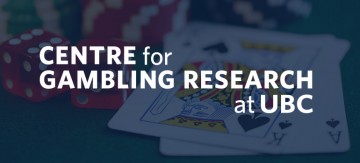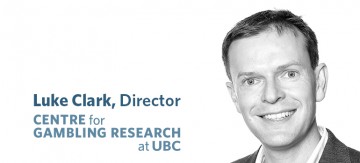Learn more about the Centre
Studying the psychology and the neuroscience of gambling games and problem gamblers.
BAP symposium: ‘Chickens and eggs: separating cause and effect in drug addiction’
Dr. Luke Clark is chairing a symposium ‘Chickens and eggs: separating cause and effect in drug addiction’ at the British Association for Psychopharmacology summer meeting in Cambridge, UK, 22nd July 2014. More details on the BAP summer meeting
International Society for Research on Impulsivity annual meeting: July 24
The International Society for Research on Impulsivity (InSRI) annual meeting will take place in Cambridge, UK on 24 July 2014 as a satellite to the BAP meeting, co-organised by Dr Luke Clark. More details on the annual meeting
UBC Summer Institute on Addiction session: ‘Gambling on the Brain’
Dr. Luke Clark, inaugural Director of the Centre for Gambling Research at UBC, joined Dr. Perry Kendall, British Columbia Provincial Health Officer, for an interactive session focusing on how neuroscience research is informing addiction practice and policy and what supports are available for individuals and families. Speakers include: Luke Clark, Director, Centre for Gambling Research […]
A Conversation with Luke Clark
Dr. Luke Clark, a global expert in the field of gambling research, joined the Department of Psychology as the inaugural director of the Centre for Gambling Research at UBC. Dr. Clark, who led the UK’s largest study of pathological gamblers, will lead the academic and operational activities of the Centre beginning July 1, 2014. We […]
BBC – Can we become addicted to technology?
Through smartphones, tablets, laptops and their apps, technology now influences almost every aspect of our lives, and many fear that this digital way of life can be dangerously addictive. more
Daily Mail – Scientists pinpoint part of the brain linked to addiction
Scientists think that when this brain area is overactive, the heart rules our head and we can’t help but chase our losses. The Cambridge University researchers said: ‘Future treatments for gambling addiction could seek to reduce this hyperactivity, either by drugs or psychological techniques.’ more
Independent – The gambler’s fallacy explained? Misguided belief in the big win just around the corner could be down to brain activity
A study has identified a region of the brain that appears to play a critical role in supporting the distorted thinking which makes people more likely to gamble because they mistakenly think they have a better-than-average chance of winning. more
University of Cambridge News – New study reveals scale of problem gambling among homeless population
Homeless people are ten times more likely to be problem gamblers than the UK population as a whole, researchers at Cambridge have found. more
UBC News – Gambling research pioneer to lead new centre at UBC
Luke Clark will lead the Centre for Gambling Research at UBC. Photo: UBC Psychology. Leading gambling psychologist Luke Clark will join the University of British Columbia’s Dept. of Psychology as inaugural director of the Centre for Gambling Research at UBC to advance research and understanding of problem gambling behaviours. Clark, who led the U.K.’s largest […]

